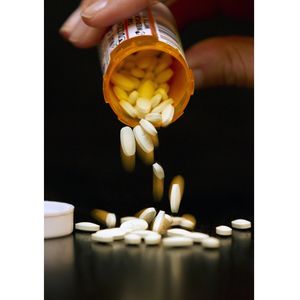
Study Highlights:
- Patients who took the generic version of the anti-platelet drug clopidogrel after hospitalization for a heart attack or heart-related chest pain had roughly the same odds of death or recurrent heart attack than those who took the brand-name product Plavix®.
- This indicates that, in real-world use, patients do just as well with generic clopidogrel as with the far-costlier Plavix®.
Embargoed until 4 a.m. CT / 5 a.m. EDT Tuesday, March 13, 2018
DALLAS, March 13, 2018 – Generic anti-platelet drugs seem to work as well as a brand name drug for heart patients, according to new research in Circulation: Cardiovascular Quality and Outcomes, an American Heart Association journal.
When a Canadian health system switched from prescribing the brand-name anti-platelet drug Plavix® to a far-cheaper generic version, heart-attack and chest pain patients were no more likely to die from any cause or be re-hospitalized for a heart attack or unstable angina within a year than those prescribed Plavix® (17.9 percent vs. 17.6 percent).
In addition, there were no significant differences between the drug groups in the percent of patients who died or were hospitalized for any reason; had a stroke or transient ischemic attack; or who developed bleeding as a side effect of treatment.
“People can safely use generic clopidogrel. This large and real-world study should be reassuring to physicians and healthcare organizations who have been concerned about changing what is prescribed,” said Dennis T. Ko, M.D., M.Sc., lead study author and senior scientist at the Institute for Clinical Evaluative Sciences (ICES) in Toronto.
In Canada and the United States, generic drugs are approved based on small studies in healthy people showing that the active ingredient is released at equivalent levels and over the same timeframe. That suggests, but doesn’t prove, that the generic product will also have the same safety and medical benefit.
Clopidogrel is used to treat patients with acute coronary syndrome, percutaneous coronary intervention, stroke or peripheral vascular disease.
Researchers compared outcomes in patients (average age 77, 57 percent male) who were prescribed clopidogrel after hospitalization for a heart attack or heart-related chest pain (unstable angina) in Ontario, Canada, where the Ministry of Health began to automatically substitute generic clopidogrel for Plavix® once the brand name drug’s patent expired in 2012. Between 2009 and 2014, 12,643 patients were prescribed Plavix® and 11,887 generic clopidogrel.
Plavix® cost about $2.58 Canadian dollars per pill in 2010 and was projected to cost the Ontario Drug Benefit Program $72.8 million by 2012. But by switching to a generic, which costs $0.39 per pill in 2018, the expense was only $19 million Canadian dollars.
“Plavix® was one of the most commonly used drugs in cardiology, so switching to generics can reduce a lot of cost for individuals and health systems,” said Ko, who is also a cardiologist at the Schulich Heart Centre of the Sunnybrook Health Sciences Centre at the University of Toronto.
While the study was conducted in Canada, the results should apply to the United States, even if the generic drug offerings are slightly different, according to the researchers.
“There are quite a few different generic brands. In this study, we considered them as a group, but later found no differences in outcome when we compared between different generics,” said co-principal investigator Cynthia Jackevicius, Pharm.D., M.Sc., professor of pharmacy at Western University of Health Sciences and senior adjunct scientist at ICES.
The American Heart Association recommends clopidogrel – sometimes in combination with other drugs – for patients who have had acute coronary syndrome (unstable angina or heart attack) or stroke.
Other co-authors are Harlan M. Krumholz, M.D., S.M.; Jack V. Tu, M.D., Ph.D.; Peter C. Austin, Ph.D.; Therese A. Stukel, Ph.D.; Maria Koh, M.Sc.; Alice Chong, B.Sc; and Jose Francisco de Melo Jr. Author disclosures are on the manuscript.
The Heart and Stroke Foundation of Canada funded the study.
Additional Resources:
###
Statements and conclusions of study authors published in American Heart Association scientific journals are solely those of the study authors and do not necessarily reflect the association’s policy or position. The association makes no representation or guarantee as to their accuracy or reliability. The association receives funding primarily from individuals; foundations and corporations (including pharmaceutical, device manufacturers and other companies) also make donations and fund specific association programs and events. The association has strict policies to prevent these relationships from influencing the science content. Revenues from pharmaceutical and device corporations and health insurance providers are available at www.heart.org/corporatefunding.
About the American Heart Association
The American Heart Association is devoted to saving people from heart disease and stroke – the two leading causes of death in the world. We team with millions of volunteers to fund innovative research, fight for stronger public health policies and provide lifesaving tools and information to prevent and treat these diseases. The Dallas-based association is the nation’s oldest and largest voluntary organization dedicated to fighting heart disease and stroke. To learn more or to get involved, call 1-800-AHA-USA1, visit heart.org or call any of our offices around the country. Follow us on Facebook and Twitter.
For Media Inquiries and AHA/ASA Spokesperson Perspective: 214-706-1173
Bridgette McNeill: 214-706-1135; bridgette.mcneil@heart.org
For Public Inquiries: 1-800-AHA-USA1 (242-8721)






Leave a Reply